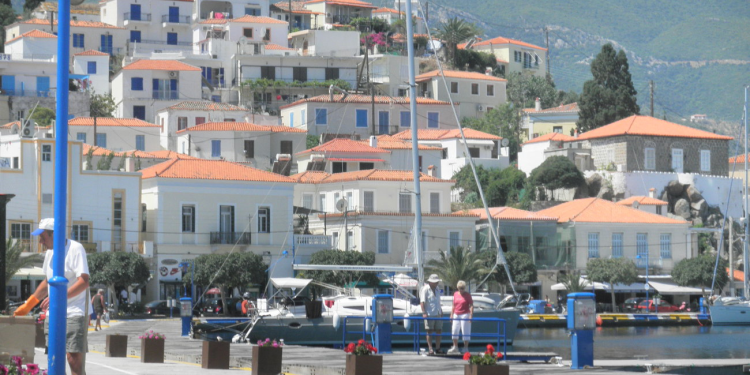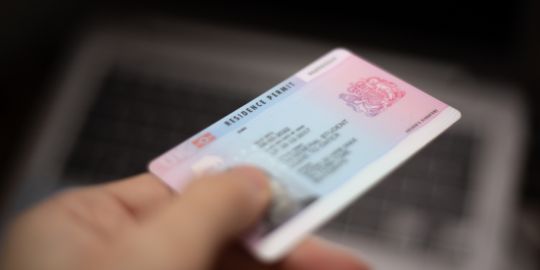Hi Linda, where are you from and what brought you to Greece?
Born and bred in far away New Zealand, I had to get out and see the rest of the world and all the relatives in the Northern hemisphere. Nowadays, this is called the OE (overseas experience, I think) and every young person has that same urge to get up and go. I just did not go back. Instead, after three years in London and two trips around Europe, I found Greece and my Greek. We got married, had two children, and now we have five grandchildren. I have been in Greece since 1976, and that is a very long time. I had always wanted to visit and explore Greece. Other countries did not attract me like Greece did, especially for its great history.
What is the process for a Kiwi expat to move here?
It was, and I believe still is, difficult for a Kiwi to stay here for any length of time. I had to apply for a visa or leave the country every 3 months and re-enter to get permission to stay for another 3 months. Eventually, I got married and became eligible for dual citizenship. Even that was hard work — so much red tape, so many papers to gather from the embassy, the police, the department of immigration and references from the community. Now civil marriages between foreigners in places such as Santorini and our own Daskalio, the little heart shaped island as you enter Poros harbour, are possible.
Why did you choose to move to Poros?
Poros is an island easy to visit. It is only two and a half hours by ferry boat from the port of Piraeus in the greater Athens area, and one hour by hydrofoil. A friend and I wanted somewhere we could reach quickly and soak up the sun, coming from a cold London. The irony of it was that the summer of 76s in Britain was one of the hottest ever. They had a heat wave, the tar on the roads melted, and office workers all suffered because windows would not open. The city was not geared for heat.
Poros is so close to the mainland — only a 5-minute car ferry or water taxi ride away. From here, you can explore all of the Peloponese, and in winter the ski fields are only a couple of hours away. Athens and Piraeus are an hour away if you want some city life and medical care is at hand. The crime rate is very low, which makes it an ideal place to bring up children. It reminds me of the small town where I grew up in New Zealand — everyone looks out for everyone else.
What has surprised you the most about Greece?
The friendliness. I could not speak Greek and not everyone could speak English but all were ready to help and do their best to understand. Sign language went a long way. Of course, the heat was what hit us immediately. Yes! We expected Greece to be hot but temperatures in June and July were like nothing I had ever experienced. A heatwave where I lived in New Zealand was around 28 ºC. Temperatures hit the mid and high 30 ºC here.

How do you find the lifestyle in Poros and Greece in general?
The lifestyle on this island was and still is laid back, unless you're waiting in line at the bank at the end of the month to pay some of the endless taxes. There is always time for a coffee with your friends on the waterfront. You can happily spend hours drinking coffee or a cold beer, and watch people passing by. For a foreigner here, sometimes the slow lifestyle can be frustrating – especially when trying to get some work done on your house or arranging papers. Just slow down and take a breath. Things are done differently here. It really helps to know someone who speaks Greek. Culture and traditions can be hard to understand at times but being a foreigner you get given a lot of leeway.
It has taken many years but I have adapted, a lot. It helps to learn the language. When you know what people are talking about and can listen in, it makes you feel more at home. You adopt what you want from their society and keep bits of your own. It is an ongoing compromise, and your life is enriched by the sharing of different cultures.
How is the everyday life for you?
I am retired, so everyday life is so much more interesting. I can go down and meet friends in the waterfront cafes for a morning tea and chat. I can get out in the garden and greet my neighbours who are busy with their fields and livestock. Life here for a grandmother is like the life in most places. Going to see grandchildren doing their swimming, ballet, or football practice. Shopping at the supermarket, cooking traditional Greek meals, which I have learnt over the years.
Could you share your most memorable experience in Greece?
We also lived on the island of Crete for three years — in a tiny village. These people just took us in as their own. On the first day we moved in, we found a big bag of grapes on the doorstep, and the villagers just continued to give and give. We were overwhelmed with oil and tomatoes, and whatever was in season in their gardens. They gave us advice, looked out for our children, who ran free in the fields, invited us into their homes, and would take nothing in return. It was a piece of paradise. Crete is a terrific place to visit. It has a little bit of everything — lakes, mountains, big cities, small unchanged villages, sandy beaches, and ancient history at every step.
What is your opinion on the cost of living in Greece?
Greece used to be very cheap. Nowadays, it is on par with most of Europe. Some things are more expensive, some cheaper. It is definitely cheaper to eat out here.

What do you do in your free time?
Leisure time in the summer is definitely spent on the beach. Poros is a wonderful place for long walks either along the flat harbour roads or up in the hills among the pine trees. There are water sports. Our grandchildren do rowing and kayaking, and play tennis. In the summer there are exhibitions, concerts, and theatre shows almost every night. The cinema is on a roof top, and shows the latest foreign movies with Greek subtitles. Even in the winter, there are movie nights and expat gatherings in local tavernas — often to raise money for the stray dogs and cats. And naturally my favourite pastime is people watching from a cafeteria on the waterfront. There is always something happening, from the arrival of the hydrofoil to the constant to and fro of the taxi boats.
What do you think of the local cuisine? What are your favourite dishes?
Where to start? Summer is stuffed tomatoes and peppers, moussaka, fresh fried or grilled fish straight from the fisherman's boat with boiled greens and a little olive oil and lemon juice, kalamari, stuffed vine leaves, the well-known tzatiki. Every season has a different list of dishes. Winter is meat roasted in clay pots with melting lumps of cheese, rabbit with onions, giant beans stewed in tomatoes and barbecued village sausages. There is a lot to like, a tremendous array of tastes to try, and it is so nutricious. During the lent, we eat taramousalata (fish roe dip), lots of beans and lentils, and flat bread fresh out of the oven.
What is your favourite thing about Greece?
The people here know how to enjoy themselves. Even in times of hardship, they will be ready to get up to dance and sing. They will get the most out of life, and those in the village or the island are usually satisfied to be where they are with whatever they have. Families keep together and look after each other. By this I mean the extended family — cousins, koumbari, godparents, and the best man or woman at your wedding. Times are changing, and life in the big cities is changing too, but the basic values remain the same.
What do you miss the most about your home country?
There I can speak the language, I know the rules, it is home. But here is home as well. What can I say? The first years were hard. I missed the food, my other family, the cooler temperatures, the organization, the smell of a bookshop, the variety in the shops, the greenness. Now I cook the food I miss or find it online, and as long as the family keeps on visiting all is well.
What has motivated you to write your blog "Local Kiwi Alien"?
I always loved to write and wrote long letters to my family in New Zealand about life here. One day, I realised that other people were interested in the way of life in Greece, and I turned the family newsletter into a blog. There are so many differences in the life here to comment on, and I love comparing how things have changed and evolved over the years. My late mother-in-law used to think that the whole world spoke Greek, and could never understand why I didn't speak the language fluently. Now her great grandchildren speak French and English, as well as Greek.

Could you give us some tips that soon-to-be-expatriates in Greece will benefit from?
Don't expect everything to be as it was in your home country. Things are done dirrerently, and may take longer. Be patient. It really helps to meet other expats and talk it all over. I used to go to coffee mornings with other foreign mothers, and we would have a good laugh. We discussed where to buy the best baby stroller, which supermarket had foreign goods, and the trouble we had communicating. It makes life a lot easier when you know that there are many others going through the same experience.
What are your plans for the future?
Hopefully, I'll be able to take the whole family back to New Zealand in the next few years. We all went back – daughters, husbands, and some of the grandchildren ten years ago. Everyone wants to go again, and now that the grandchildren are older, they will have a fabulous time, and meet all the cousins that haven't visited yet. And maybe the grandchildren will stay and study.

















Contact us to be featured in the Interviews section.
Participate